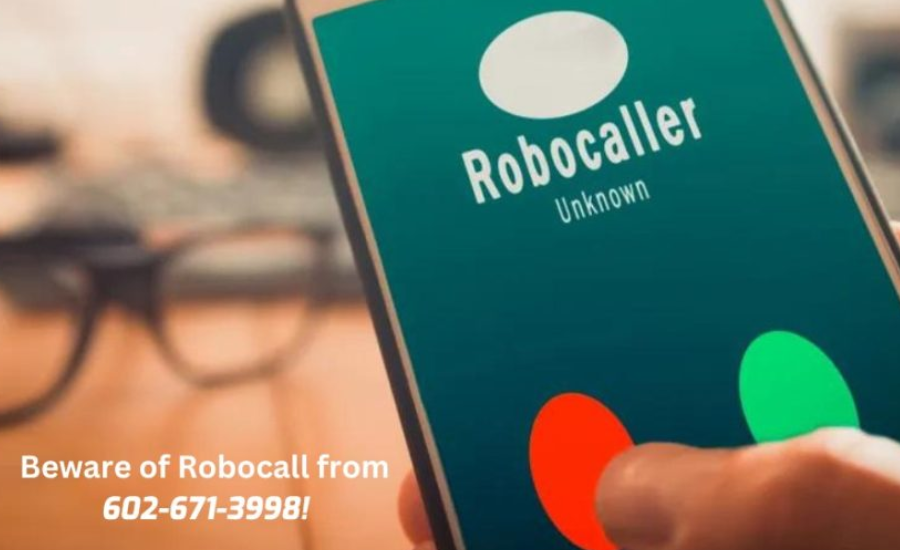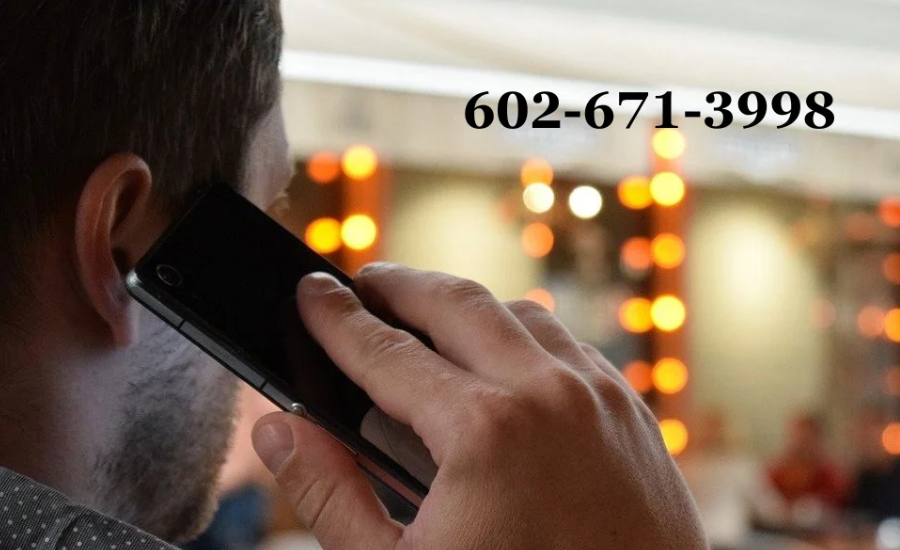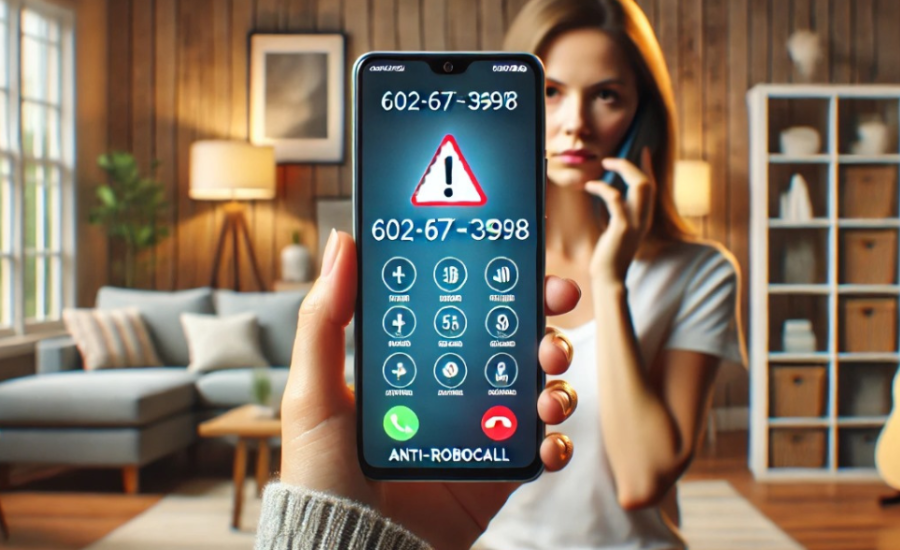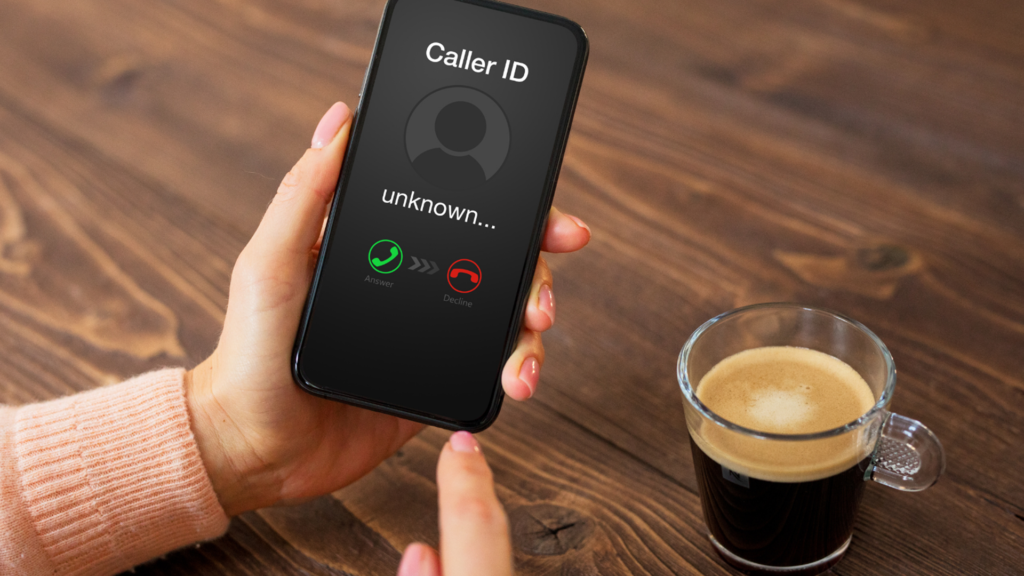Receiving unexpected calls from unfamiliar numbers can be alarming, particularly when the number has been flagged as suspicious, like 602-671-3998. Reports have surfaced from numerous individuals across the U.S. about this specific number, raising concerns about potential scams, telemarketing, or fraud attempts. In this guide, we will delve into details about 602-671-3998, explore common scam tactics, share ways to protect yourself, and outline steps you can take if this number contacts you.
What Is the Number 602-671-3998?

The phone number 602-671-3998 has been associated with unsolicited and suspicious calls. It has a 602 area code, which is linked to Phoenix, Arizona. Many people have reported receiving calls from this number, but the purpose of these calls can vary widely. While some individuals describe the calls as telemarketing, others have raised alarms about scam-like behavior. If you get a call from this number, proceed with caution—especially if the caller requests personal or sensitive information, like financial details or Social Security numbers.
Is 602-671-3998 Linked to Scams?
There is strong evidence that 602-671-3998 is connected to scam activity. Callers using this number often exhibit behaviors consistent with common scam tactics. Warning signs include:
- Requests for personal data, including Social Security numbers, banking details, or credit card information.
- Promises of rewards or prizes that seem suspicious or too good to be true.
- Pressure tactics, such as claims that you owe money and legal action will be taken unless you comply immediately.
While telemarketing calls themselves aren’t always dangerous, scam calls can lead to serious issues, including identity theft and financial fraud. It’s essential to be vigilant and protect your personal information when dealing with unknown callers.
Common Scams Associated with 602-671-3998

Several types of scams have been linked to calls from 602-671-3998. Below are some of the most prevalent scams reported:
a. IRS Scams
One of the more common scams involves the caller pretending to be an IRS representative. They may claim that you owe unpaid taxes and threaten legal action or arrest unless you make immediate payment. Keep in mind, the IRS will never call to demand immediate payment—especially not over the phone.
b. Tech Support Scams
Another widespread scam involves callers claiming that your computer or another device is compromised. They may offer to “fix” the problem for a fee or attempt to gain remote access to your computer, which can lead to identity theft or data breaches.
c. Prize or Lottery Scams
Some calls inform victims they’ve won a lottery or prize but require payment or personal information to claim it. Legitimate organizations will never ask for payment upfront to claim a prize, so this is a significant red flag.
d. Charity Scams
In these scenarios, scammers may pretend to represent a charitable organization, often using emotional stories to encourage donations. Always verify the legitimacy of any charity before donating money or providing personal information.
e. Bank or Credit Card Scams
Scammers may claim to be from your bank or credit card company, stating that there’s been suspicious activity on your account. They will then ask for your account details under the guise of “verification.” In such situations, always contact your bank directly using official channels.
How to Protect Yourself from Scams

Receiving a call from 602-671-3998 or any unfamiliar number can be unsettling, but there are several proactive measures you can take to protect yourself from scams:
a. Avoid Answering Unfamiliar Numbers
If you don’t recognize the number, it’s best to let the call go to voicemail. Scammers typically don’t leave messages, whereas legitimate businesses will often leave clear instructions or reasons for their call.
b. Verify the Caller’s Identity
If the caller claims to represent a legitimate organization, ask for their name, department, and a callback number. Then, independently verify the caller’s authenticity by contacting the organization through official channels.
c. Never Share Personal Information
Under no circumstances should you provide personal information such as Social Security numbers, bank account details, or credit card information over the phone unless you are 100% sure of the caller’s legitimacy.
d. Use Call-Blocking Apps
Consider using apps like Hiya, Truecaller, or Nomorobo, which can help block spam and scam calls. These apps can identify known scam numbers and prevent them from reaching you.
e. Trust Your Instincts and Hang Up
If something feels off, or the caller becomes aggressive or demanding, hang up immediately. Trust your instincts—scammers often use high-pressure tactics to force quick decisions.
What to Do If You Receive a Call from 602-671-3998

Receiving a suspicious call from an unknown number like 602-671-3998 can be unsettling, especially with the rise in scam and fraudulent activities targeting unsuspecting individuals. To handle the situation carefully and protect yourself from potential threats, follow these steps:
1. Don’t Answer the Call
If you don’t recognize the number, it’s safer to let the call go to voicemail. Scammers and telemarketers often rely on immediate engagement to catch you off guard. By avoiding picking up, you reduce the chances of falling victim to their tactics. Even if you’re curious, it’s better to let it pass and deal with it later through proper channels.
2. Check for Voicemail Messages
If a voicemail is left, take the time to listen carefully. Pay attention to any red flags in the message. Scammers often use tactics like creating a sense of urgency, threatening legal action, or claiming you’ve won a prize. If the message demands immediate action, requests personal details, or sounds too good to be true, avoid calling back. Legitimate companies or government agencies will rarely pressure you to respond so urgently over the phone.
3. Conduct a Reverse Phone Lookup
If you feel uncertain about the caller, using a reverse phone lookup service can provide insights. There are several websites and apps where you can enter the phone number (in this case, 602-671-3998) and check if other people have reported suspicious activity associated with it. Seeing multiple complaints or scam warnings about the number confirms that it’s better to avoid any interaction with it.
4. Block the Number
Once you have verified that the number is suspicious or linked to scams, it’s advisable to block the number to prevent future calls. Most modern smartphones come with an inbuilt feature that allows you to block specific phone numbers. On both iOS and Android devices, you can easily add 602-671-3998 to your blocked contacts list. This ensures that the caller will not be able to contact you again via that number.
- For iPhone Users: Open the phone app, go to your recent calls, find the number, tap the info icon next to it, and then select “Block this Caller.”
- For Android Users: Access your call history, tap on the number, select “Block” or “Report as Spam” from the menu options.
5. Report the Call to Authorities
If you believe the call is part of a scam, it’s essential to report the incident to authorities. This not only helps you stay protected but also contributes to broader efforts in tracking down scam operations. Here are a few key agencies to consider when reporting:
- Federal Trade Commission (FTC): You can file a report online at the FTC’s official website. This helps the agency monitor fraudulent activities and take action against scammers.
- Your Phone Carrier: Many phone companies now offer dedicated services for reporting spam or scam calls. Check with your service provider to see if they have tools available.
- Better Business Bureau (BBB): If the call involves a fraudulent business, you can report it to the BBB to help warn others.
You should also consider filing a complaint with your state’s attorney general or consumer protection office, especially if the scam appears to be widespread or highly aggressive.
6. Monitor Your Financial Accounts
If, by chance, you accidentally provided any personal information during the call, you should take immediate steps to secure your accounts. This includes:
- Monitoring Bank Accounts: Regularly check your bank statements and account activity for any unauthorized charges or transactions. If you see any unusual activity, contact your bank to freeze or close the account if necessary.
- Credit Card Accounts: Review your credit card statements closely and ensure no unknown purchases have been made. If you suspect fraud, report it to your credit card company right away.
- Check Your Credit Report: It’s a good idea to monitor your credit report for signs of identity theft. You can request a free credit report once a year from each of the three major credit bureaus (Equifax, Experian, and TransUnion) to ensure there’s no suspicious activity linked to your identity.
- Change Passwords and PINs: If you shared login credentials, change your passwords immediately, especially for financial accounts or sensitive platforms. Use strong, unique passwords and consider enabling two-factor authentication (2FA) for added security.
7. Be Cautious Moving Forward
It’s vital to remain vigilant after receiving a scam call. Scammers often sell phone numbers to other scammers, so you might experience more calls in the future. Continue to avoid unknown numbers, and always be cautious when sharing any personal information over the phone, especially with unsolicited callers.
How to Report Scam Calls

If you suspect that you’ve received a scam call from 602-671-3998 or any other suspicious number, reporting it is a critical step in helping authorities track down fraudulent operations and protecting others from falling victim. Here’s a detailed guide on how to report these calls and what agencies you can reach out to.
1. File a Report with the Federal Trade Commission (FTC)
The Federal Trade Commission (FTC) is one of the primary agencies responsible for protecting consumers from fraudulent activities, including phone scams. Reporting scam calls to the FTC allows them to gather information about the scammers’ tactics and take appropriate actions to stop fraudulent operations.
- How to Report: You can file a report online at the FTC’s official website (ftc.gov). They have a simple form that allows you to detail the scam call, including the phone number, the caller’s behavior, and any requests for personal information.
- Why It’s Important: The FTC uses reports from consumers to track scam trends, launch investigations, and potentially shut down fraudulent businesses. Even if the call seems minor, your report could be part of a larger investigation.
2. Contact Your Phone Service Provider
Many phone companies have implemented dedicated services to help customers report scam or spam calls. By alerting your phone carrier to the scam, you’re contributing to efforts that may prevent other users from receiving similar calls.
- How to Report: Depending on your carrier, you can report scam calls by contacting their customer service or using specific scam-reporting features they offer. For example:
- AT&T: Allows you to forward spam or scam texts to 7726 or report scam calls through their “Call Protect” app.
- Verizon: Offers the “Call Filter” feature, which automatically identifies and blocks scam calls, and lets you report numbers through the app.
- T-Mobile: Uses “Scam Shield,” a service that flags potential scam calls and allows customers to report numbers directly.
- Why It’s Important: By reporting scam calls to your phone provider, you help them block these numbers on a larger scale, potentially shielding thousands of other customers from the same fraudulent callers.
3. Report to the Better Business Bureau (BBB)

If the scam involves a company or business, or if the caller is posing as a legitimate business, it’s helpful to report the incident to the Better Business Bureau (BBB). The BBB tracks complaints about businesses and can help inform the public about scam operations linked to specific companies.
Legal Efforts to Combat Phone Scams
The U.S. government has implemented various measures to fight the rise of phone scams, including the creation of the National Do Not Call Registry. However, while this registry helps reduce telemarketing calls, scammers often find ways to bypass these protections.
a. Fines and Penalties for Scammers
The FTC and other governmental bodies have imposed significant fines and penalties on individuals and organizations involved in fraudulent phone scams. Depending on the severity, scammers can face steep fines and even jail time.
b. The Fight Against Robocalls
In 2021, new legislation was introduced to curb the growing issue of robocalls. This law requires phone companies to implement technology that can block robocalls from unverified numbers, offering more protection to consumers.
Facts
- Location: The 602 area code is registered in Phoenix, Arizona.
- Caller Behavior: Multiple reports indicate that 602-671-3998 is linked to unsolicited and suspicious calls, often using common scam tactics.
- Common Scams: The number has been associated with scams such as IRS impersonation, tech support fraud, prize or lottery scams, charity fraud, and bank/credit card scams.
- Requests for Personal Data: Many callers using this number have requested sensitive information like Social Security numbers, bank details, and credit card info.
- Pressure Tactics: The number has been known to use scare tactics, such as claiming legal action will be taken if immediate payment is not made.
FAQs
Q: What should I do if I receive a call from 602-671-3998?
A: Avoid answering the call if you don’t recognize the number. If you do answer, do not provide any personal information, and hang up immediately if the caller becomes suspicious.
Q: Is 602-671-3998 a scam number?
A: Yes, there are multiple reports suggesting that 602-671-3998 is linked to scam activities, especially ones that attempt to steal personal information or demand payments under false pretenses.
Q: What types of scams are linked to 602-671-3998?
A: Common scams include IRS impersonation, fake tech support, fraudulent prize claims, charity fraud, and bank verification scams.
Q: Can I block 602-671-3998?
A: Yes, you can block the number using your phone’s inbuilt call-blocking feature. Additionally, apps like Hiya or Truecaller can help block spam and scam calls.
Q: How can I report 602-671-3998?
A: You can report the number to the Federal Trade Commission (FTC), your phone provider, and the Better Business Bureau (BBB). Each of these organizations tracks and takes action against scammers.
Related: 1866-3688266/
Conclusion
Receiving a call from 602-671-3998 can be concerning, given the number’s connection to fraudulent activities. The number has been flagged for IRS, tech support, and prize scams, among others. To protect yourself, avoid answering unfamiliar numbers, never provide personal details to unsolicited callers, and use call-blocking tools. If you suspect fraudulent activity, reporting the call to the FTC, your phone provider, and the BBB can help curb such scams and prevent others from falling victim.
Staying informed and cautious is your best defense against phone scams. Essential Discover





